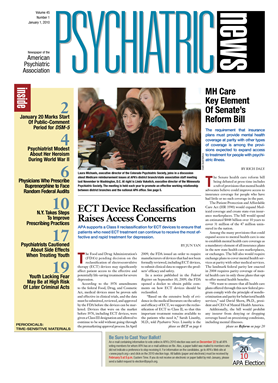Would a severely ill psychiatric patient thank you later for forcing medication on him or her?
If the patient regained full mental capacity as a result, chances are good that he or she would. But if the patient did not, chances are fair that he or she would not.
These are the implications of a study headed by Gareth Owen, M.D., a Wellcome Trust clinical research fellow at the Institute of Psychiatry at King's College, London. Results were published in the November 2009 British Journal of Psychiatry.
The aim of the study was to see what psychiatric patients think about their involuntary treatment after the fact. This appears to be the first study to “have investigated individuals' views on such treatment decisions after they had regained capacity,” Owen and his colleagues said.
Between February 2006 and June 2007, 350 seriously mentally ill patients living in a deprived inner-city area of London were consecutively admitted to Maudsley Hospital for treatment. Out of the 350 patients, 115 were found to lack capacity to make treatment decisions, as determined by clinical assessment and the MacArthur competence Assessment Tool for Treatment.
A month later, or earlier if they were discharged before a month was up, the 115 patients were again evaluated for mental capacity. Also at this time, they were asked whether they would consent to an interview regarding their views on having been treated involuntarily. Ninety-four gave their approval, although only 35 had regained full mental capacity according to the standards mentioned above. The remaining 59 had not regained enough capacity to make treatment decisions, yet had regained enough mental clarity to give an opinion about the treatment they had received, Owen told Psychiatric News.
Out of the patients who had regained full mental capacity, 83 percent said that the right treatment decisions had been made on their behalf—even if their initial treatment wishes had been overridden. But out of the 59 who had regained partial mental capacity, only 41 percent said that the right decisions had been made on their behalf. In brief, patients were significantly more likely to give retrospective approval of the treatment they had received if they had regained full mental capacity than if they had not.
“Most participants who regained capacity agreed with the surrogate decision making that had taken place during their admission to hospital,” wrote the authors. “They may not have much liked the process of admission or the services received … but they indicated approval nonetheless.” This finding “might moderate concerns both about surrogate decision making by psychiatrists and advance decision making by people with mental illness.”
The study was funded by the Wellcome Trust and the South London Maudsley NHS Foundation Trust.
